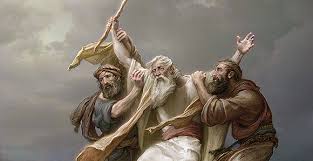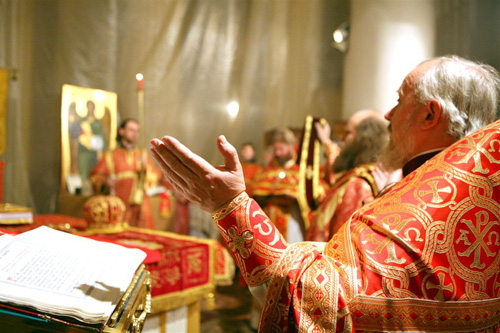 After Israel was brought out of Egypt and as they journeyed to the foot of Mount Sinai, they faced a multitude of dangers in the howling wilderness. They faced the threat of starvation as they slowly trudged southward through the west side of the Sinai peninsula, and in response God provided for them through the provision of manna. They faced the threat of dying from thirst, and in response God provided for them by bringing water from the rock. And perhaps more terrifying than these silent challenges to their existence, they faced the threat of ultimate extermination from the Amalekites who warred against them as plodded ever onward.
After Israel was brought out of Egypt and as they journeyed to the foot of Mount Sinai, they faced a multitude of dangers in the howling wilderness. They faced the threat of starvation as they slowly trudged southward through the west side of the Sinai peninsula, and in response God provided for them through the provision of manna. They faced the threat of dying from thirst, and in response God provided for them by bringing water from the rock. And perhaps more terrifying than these silent challenges to their existence, they faced the threat of ultimate extermination from the Amalekites who warred against them as plodded ever onward.
The Amalekites were a Bedouin tribe that seems to have lived mostly in the Negev, the southern part of the Holy Land (Numbers 13:29). It appears that the Amalekites knew that Israel was heading through the Sinai peninsula on their way to Palestine and wanted to prevent their entry into what they considered their own territory. They therefore began to harass them, picking off the weakest, most helpless, the stragglers at the fringes of the company (Deuteronomy 25:17-18).
It was a contemptible strategy, combining both cruelty and cowardice. Israel as a whole was hardly an armed company, since they left Egypt with their pots and pans and with some silver and gold, but not with weapons enough to fully arm and defend themselves against a seasoned enemy. The Amalekites struck those who lagged behind, killing the women, the elderly, and the children. The men from the main body of Israel could only look on helplessly as Amalek swooped down on the helpless, slaughtered them, and then galloped away. The Amalekites were not just another Bedouin tribe; they were the embodiment of all that was wrong in the world; a kind of walking Covid virus, preying upon the weak and helpless. Even in days of David they were still raiding and marauding, burning villages and carrying off women and children (1 Samuel 30:1-2).
We read of God provision for Israel’s safety and survival in Exodus 17:8-16. Moses commanded Joshua to pick men who would fight Amalek the next time they attacked. By merely human figuring, it would be an unequal battle, for the Amalekites were seasoned warriors with well-used weapons; the Israelites were recently liberated slaves with no experience of warfare and few resources to wage it. They needed not just courage; they needed help from their God.
To secure this help, Moses climbed to the top of a hill with the rod of God in his hand. He stood at the top of the hill and stretched out his hands in a posture of prayer and supplication. As long as he remained in such supplication, Israel prevailed on the battlefield below him. But when he grew slack and lowered his hands, Amalek prevailed. To ensure success, Aaron and Hur set up a stone there for Moses to sit upon and stood on either side of him, both of them holding his arms aloft, keeping them steady until the setting of the sun and Israel’s final victory.
After the victory, God commanded Moses to create a lasting memorial of the event, as a pledge that Israel would remember and wage war against Amalek throughout the coming generations until they had been blotted out of human memory. In obedience Moses built an altar there on the site, inscribing upon it the words “Yahweh my Banner”—i.e. Yahweh was their battle standard, their hope of victory over all their foes, and devotion to Him would keep them safe. Israel would long remember this battle and obey the divine mandate to wage war against Amalek. When Israel welcomed Saul as their first dynastic king, one of his first tasks was to wage holy war against the raiding Amalekites (1 Samuel 15).
This brief glimpse at Israel’s first encounter with Amalek offers us two things—a prophecy and a lesson.
The prophecy is found in the posture of Moses. Witnesses that day could look up and see him on the lonely hill surrounded by tumult and battle, lifting up his arms. As the long day turned to evening, he was still atop that hill, now with a man on either side of him, and his arms still outstretched on either side. His outstretched arms brought victory in the battle, and gave life to God’s people. Later Christian eyes read of that day and saw another Man on a lonely hill with outstretched arms, surrounded by the tumult and battle of the world. The world beneath that hill was filled with war, and teemed with the enemies of God’s people—both visible and invisible enemies. That Man also had men on either side of Him, witnessing His prayer. And by His outstretched arms God brought victory over the foe, and eternal life to His people. Moses’ outstretched arms prefigured the saving and bleeding outstretched arms of Christ, and the hill on which Moses ascended in the Sinai peninsula prefigured the holy hill of Golgotha. Moses stayed there until the evening and until the battle was won. Christ remained on the cross until the ninth hour, giving victory to all who would trust in His saving death.
The lesson is found in the altar that Moses built—an altar built as a memorial to that victory over Amalek and as a mandate to wage war against the cruel foe until not a trace of him remained, for “Yahweh will have war with Amalek from generation to generation” (Exodus 17:16). We also are called to wage war against the foe throughout this age, and we must never stop until the evil is utterly blotted out from under heaven.
But our enemy is not flesh and blood. We do not war against people, but against the demons, against the world rulers of this present darkness, the spiritual armies of evil in the heavenlies (Ephesians 6:12). The temptation is to make a treaty with evil, to tolerate at least some evil within our hearts, to imagine that saving repentance can be partial, and that we can make a bargain with the devil and with death. No such treaty is possible. As George McDonald once reminded us, “There is no heaven with a little hell in it—no plan to retain this or that of the devil in our hearts or our pockets. Out Satan must go, every hair and feather”. Our repentance must be total; our hatred of evil and of the devil, relentless and uncompromising. Only with such steely determination can the inner battle be won. Yahweh would have us war against sin and Satan from generation to generation, and never cease fighting until the evil is gone.
The Church bids us take part in this ceaseless war against sin and death. When one is made a catechumen, before one is even baptized, the priest lays his hand upon the candidate’s head, thereby making him into a “sealed, newly-enlisted soldier of Christ our God”. It is our duty and privilege to fight under Christ’s banner against the spiritual hordes of Amalek, for Christ has stretched out His arms for us on the cross. The final victory has already been won.

















